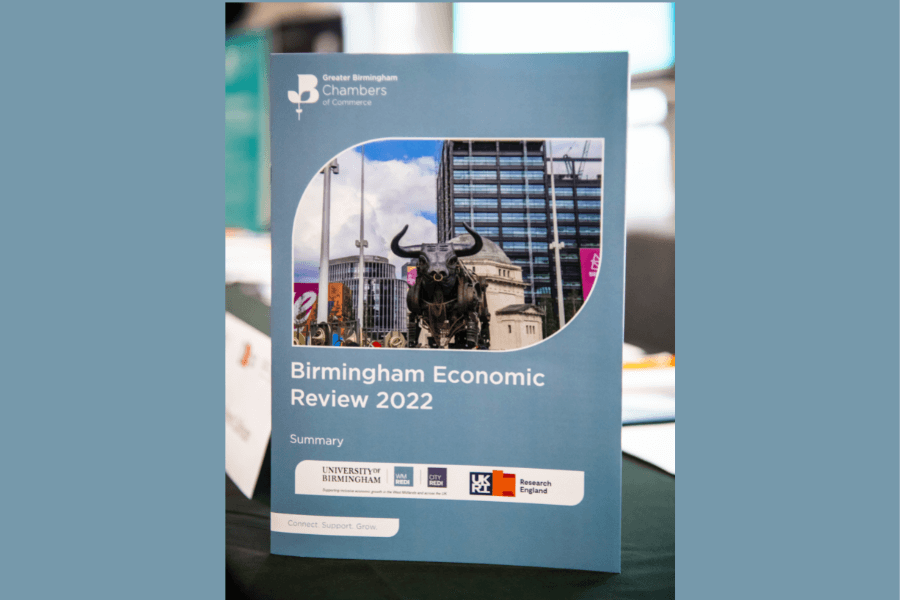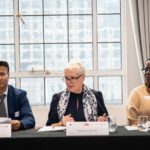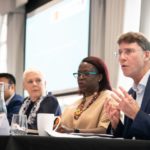On 20 October 2022, a launch event was held for the Birmingham Economic Review. This blog provides a summary of some of the key points to come out of the event.
The Birmingham Economic Review (BER) is produced by City-REDI / WMREDI, the University of Birmingham and the Greater Birmingham Chambers of Commerce. It is an in-depth exploration of the economy of England’s second city and a high-quality resource for informing research, policy and investment decisions.
View and download the Birmingham Economic Review
The launch was held at the University of Birmingham’s Exchange building, with 140 people in attendance. The event opened with a welcome from Professor Adam Tickell, Vice-Chancellor and Principal of the University of Birmingham.
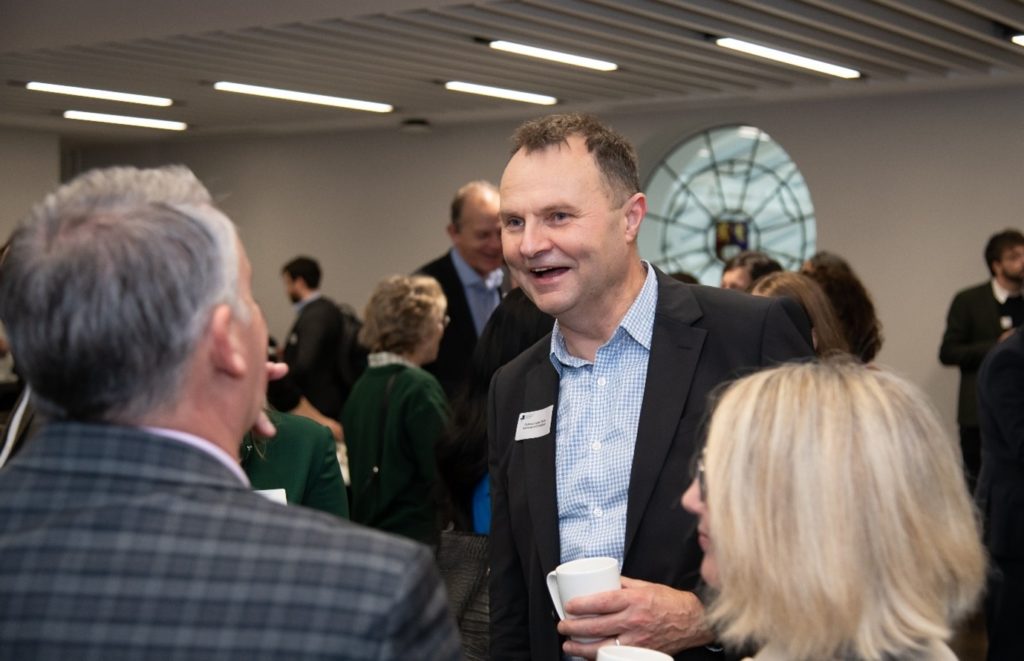
Overview of the Birmingham Economic Review
First delegates heard from the Director of City-REDI / WMREDI, Professor Simon Collinson who provided an overview of this year’s BER. Professor Collinson stated that the West Midlands was dealing with a triple shock, from Brexit, Covid and the war in Ukraine, and that the West Midlands region has been hit harder than most by the effects of these shocks:
- Regional GVA declined by 11.8% in 2020 and recovery has been slower than in other UK regions.
- 41% of our communities in Birmingham are in the top 10% of the most deprived areas in the UK.
- We have a widening trade deficit with exports lower than imports.
- Inward investment had dropped 11% in the last 2 years, leading to lower job creation and safeguarding.
- Life expectancy is lower than the national average.
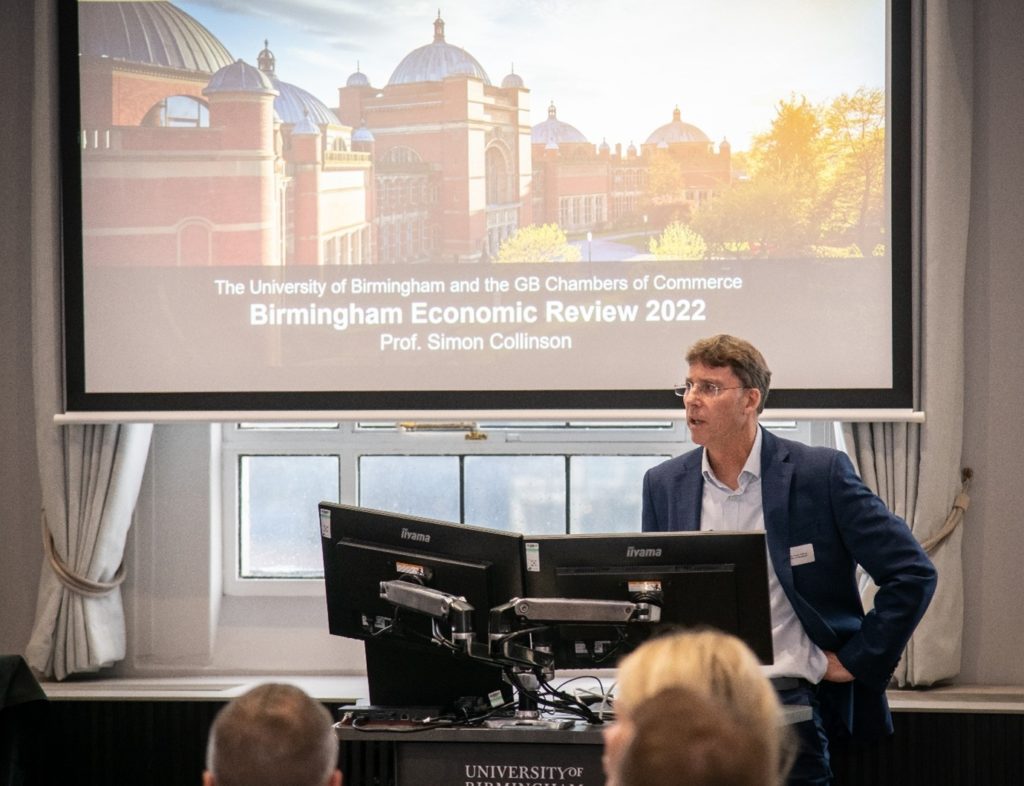
However, Professor Collinson highlighted that there were a lot of opportunities and positives for the region:
- Unemployment was down from 6.5% (Q4 2020) to 4.7% (July 2022)
- There had been an improvement in skills attainment in the region, with NVQ 4+ levels rising from 31.8% in 2017 to 39.7% in 2022.
- A £50 billion growth opportunity across the UK exists in bridging the digital skills supply-demand gap. This has the potential to add £2.7 billion in economic growth and 52,000 new jobs in 4 years to this region, leveraging 5G opportunities.
- The legacy of the Birmingham 2022 Commonwealth Games. It is estimated hundreds of millions tuned in globally to watch the Games. Almost £800m of public investment continues to drive regeneration and investment across the city and the Business and Tourism Programme aims to continue the legacy of the Games by promoting the region’s reputation as a leading destination for tourism, trade and investment.
- The construction of the London-Crewe High Speed 2 route is well underway, with almost 25,000 jobs, over 800 apprentices and more than 2,400 UK-registered businesses already involved.
- The Department for Transport has confirmed a five-year, £1.05 billion City Region Sustainable Transport Settlement for the West Midlands Combined Authority, intended to support the further extension of the Metro, improvements to bus services, development of new rail stations, multi-modal transport accessibility, sustainable travel, infrastructure maintenance and the improvement of local networks.
Chair and the Panel Members
Professor Collinson then passed over to Deb Leary, Chair of the event and President of the Greater Birmingham Chambers of Commerce, who introduced the other members of the panel:
- Yetunde Dania, Chair, West Midlands Combined Authority Race Equalities Taskforce and Partner, Trowers and Hamlins
- Councillor Brigid Jones, Deputy Leader, Birmingham City Council
- Dr Josh Ahmed, Director, Anzara Ltd
First reactions to the report
Professor Simon Collinson stated that we have a tough winter coming, with 1970s-style conditions, which many businesses might not survive.
Yetunde Dania discussed the need for the West Midlands to be bold and drive a change. She stressed the importance of including everyone as if this can be achieved, we will all be better off.
Dr Josh Ahmed noted that there had been a downturn in orders for manufacturing businesses. More investment is needed in Birmingham. It is challenging to find people with the right skill set.
Brigid Jones talked about entrenched poverty in Birmingham, explaining that 46% of our children wake up in poverty. Brexit predictions have been proven to be correct.
There is an employment paradox, where there are low unemployment levels but also record vacancies. Childcare funding has caused real issues for parents and young people are overrepresented in our employment stats.
There is a wealth of potential in the West Midlands and the Commonwealth Games showed this off. Greater devolution would provide local government with better tools to address these issues.
The Birmingham County Council runs on an annual budget, which makes long-term planning a challenge. Further devolution will help with this situation.
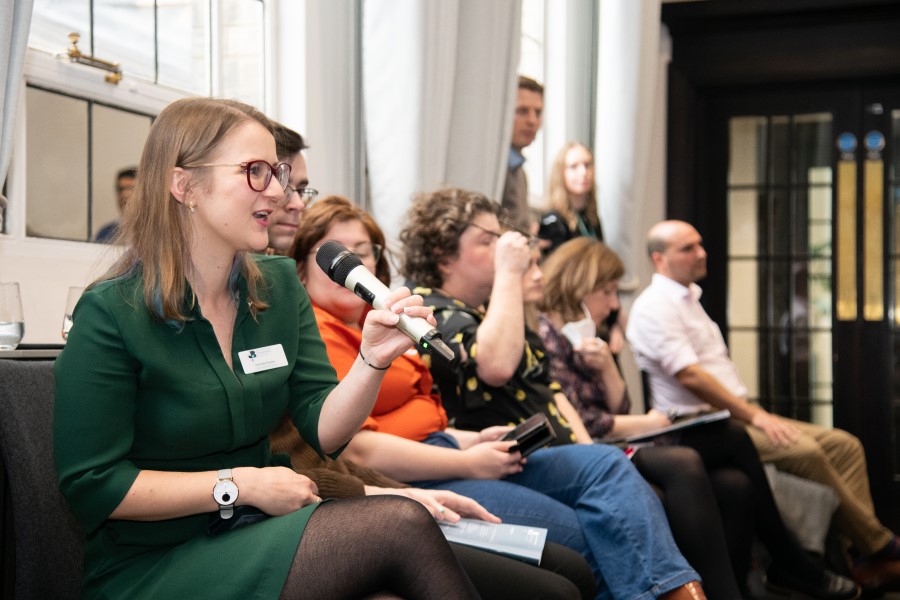
Questions from the audience
Skills
Are we doing enough in this region to improve our skill set?
The panel felt that the funding of skills was crucial, and that devolution could play an important role in investing in areas where we lack the right skills. 1.3 million people had dropped out of the workforce and there are lots of skills mismatches in the region. Whilst we are swimming in short-term solutions to the issue, long-term planning is harder to achieve as the funding landscape is short-term and chaotic. Digital poverty is also an issue, as people cannot afford to get online.
SMEs
How strong are the policies coming down from the central government to drive opportunities for SMEs? Can we regenerate our skills and workforce?
The panel members discussed the importance of SMEs, 96% of businesses in Birmingham are SMEs. At a national level, there are not any real policies to drive opportunities for SMEs and there is very little leadership on the issue. At the regional level, there has been a policy to try and buy local through procurement policies of public bodies. It is difficult for SMEs to engage with big national projects like HS2, as a small firm cannot handle the additional work required to access this work.
However, SMEs and firms in the UK also invest less in training than businesses in other countries. If we could increase investment from SMEs it would help to upskill our workforce.
The Role of Universities in the region
How do Universities view their responsibility to fill the skills gap?
Professor Collinson stated that we have an excellent portfolio of Higher Education Institutions in the region, but that Universities need to get better at leveraging and commercialising R&D. Whilst Universities are an important part of addressing the skills gap, we need improvement across the whole of the education sector.
Tax credits
97% of businesses that could claim R&D tax credits don’t. How can we improve this?
Deb Leary stated that HMRC needs to get better at processing claims. At the moment, it is taking 6-8 months to do this, which is too slow for R&D investment.
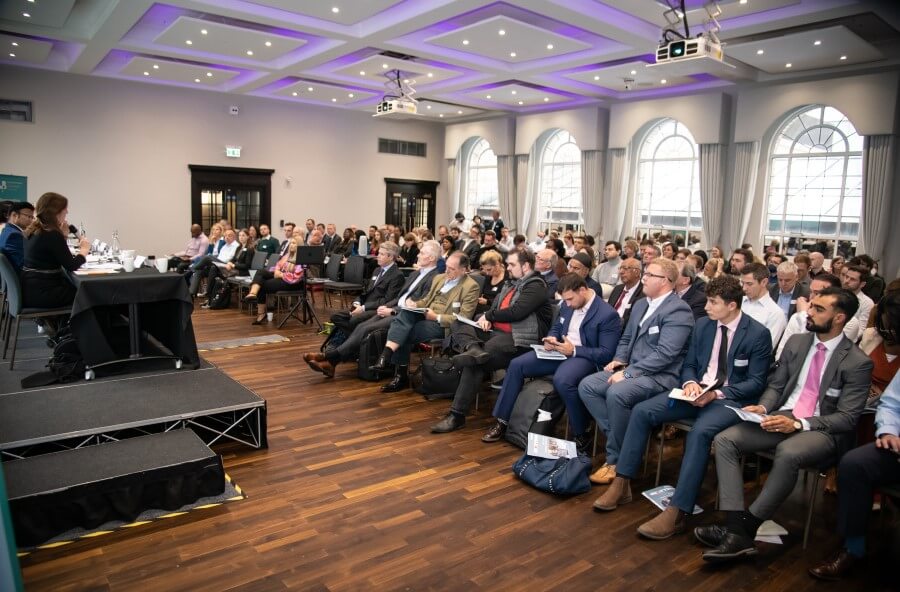
Net-Zero and the environment
Environmental, Social, and Corporate Governance (ESG) goals are excellent opportunities for underrepresented communities. But it is difficult to measure and evaluate them.
Businesses and households need short-term support to overcome the immediate problems caused by the surge in energy prices. Local government cannot afford to provide this support, so it needs to come from national government. In the long term, we need to become a hub for net-zero technology. Tyseley Energy Centre is a good example of regional partners trying to harness our expertise in this area, working with SMEs to become a global centre of net zero.
View and download the Birmingham Economic Review
Disclaimer:
The views expressed in this analysis post are those of the authors and not necessarily those of City-REDI / WMREDI or the University of Birmingham.

